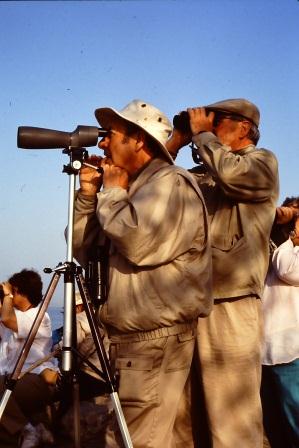J. Bruce Falls Scholarship
Awarded to a student entering fourth year; either full-time or part-time status. Awarded on the basis of financial need; academic merit may also be considered. Awarded to a student in a Specialist or Major program offered by the Department of Ecology and Evolutionary Biology.
J. Bruce Falls
After two years in the Air Force, Bruce Falls graduated in Honour Biology at U of T in 1948. He went on to obtain his doctorate in Zoology studying behaviour of small mammals. He went to Oxford as a post-doctoral fellow and toured universities and field stations in Europe meeting ecologists. He returned to U of T in 1954 to teach ecology and related subjects.
Professor Falls particularly enjoyed field courses, which he helped to initiate at U of T. He believes that contact with nature and association with faculty stimulates students’ interest in biology. Besides undergraduate teaching he supervised the research of 36 graduate students and five post-doctoral fellows.
He was an author of over 100 scientific publications. Much of his research took place at the Wildlife Research Station in Algonquin Park, and some at the Delta Field Station of the University of Manitoba. Helped by his wife Ann, also a biology graduate of U of T, he conducted a 36-year study of small mammal populations in the Park. Fluctuations in abundance were strongly influenced by weather and tree seed crops and in turn affected the numbers of predators.
Dr Falls’ main interest was in bird research. He was a pioneer in the study of bird song and its relation to territorial behaviour, basing his findings on field experiments. He and his students also investigated two colour phases of White-throated Sparrows that differ in breeding behaviour and ecology. Dr. Falls is a member or fellow of several scientific societies and a past-president of the Society of Canadian Ornithologists. He was Associate Chair of Zoology for Undergraduate Affairs (1975-80).

As a field biologist Bruce Falls was actively involved in conservation, especially the protection of natural areas. He was co-chair of the conservation panel of the International Biological Programme for Ontario. As President of the Federation of Ontario Naturalists he helped to found the Nature Conservancy of Canada in 1962, and went on to chair that organization. Later he was chair of the Long Point Bird Observatory and a founder of Bird Studies Canada. For several years he has organized the programme of a Toronto naturalists’ group, the Brodie Club.
Bruce retired in 1989, and he and his wife Ann enjoyed many years documenting many forms of life on their property in Peterborough County. Hobbies included: collecting plants and dragonflies, bird-watching, and photography. They were avid bird-watchers and took part in an annual Birdathon to support conservation. Bruce passed away in 2024 at the age of 100.
Support Us
Help our efforts to educate and train the future designers of environmental sustainability.
